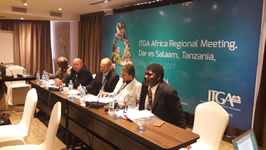 Tobacco growers are urging governments to open formal dialogues about the challenges the sector is facing due to a decrease in demand for tobacco products and the absence of viable alternative crops.
Tobacco growers are urging governments to open formal dialogues about the challenges the sector is facing due to a decrease in demand for tobacco products and the absence of viable alternative crops.
The plea was made at a meeting today organized by the International Tobacco Growers Association (ITGA) in Dar es Salaam, Tanzania, bringing together the sector, political representatives and tobacco farmers from other African tobacco growing-countries, including Malawi, South Africa, Zambia and Zimbabwe.
“Tobacco has been part of the worldwide agriculture for nearly six centuries,” said Jackson Nkuba, assistant director in Tanzania’s Ministry of Agriculture, stressing that tobacco has been Tanzania’s most important export crop for years.
Nkuba acknowledged the challenges linked to the crop and the importance of educating people about the health risks associated with tobacco use. He said the government should encourage farmers to grow alternative crops, but noted the difficulty in creating new supply chains
“Tobacco production and use is still legitimate and we want to maintain this status quo for as long as we can,” he said. “We need the collaboration of all stakeholders in the value chain to ensure that tobacco production is environmentally sustainable,” he concluded.
ITGA President Daniel Green highlighted the contribution of tobacco to many countries’ economies. Tobacco, he said, has been one of the main promoters of employment and one of the main income generators.
“We do not underestimate policies that aim to safeguard public health; the only thing we have been asking for many years now is to be part of the process that could lead tobacco growers toward a sustainable future,” he said.
Delegates also insisted on the need for tobacco growers’ representatives to participate into the process being carried by the World Health Origination’s Framework Convention on Tobacco Control (FCTC).
The ITGA meeting coincided with a regional FCTC meeting in Dar es Salaam to discuss measures related to a the convention’s articles 17 and 18, which deal with alternatives to tobacco growing and the social and environmental impact of tobacco growing.
The ITGA’s request for the participation in the FCTC meeting of its Tanzania associations, The Flue and Dark Tobacco Unions, was rejected.
“We have come to a point where it is clear that the FCTC Secretariat has exercised a veto to tobacco growers by ignoring their pleas,” said ITGA CEO Antonio Abrunhosa.
“Unlike other UN agencies that engage in discussions with relevant stakeholders to discuss the best approach to reach their goals, the FCTC underestimates one very important stakeholder in their discussions—and the one most affected by their decisions: the tobacco growing communities,” he said.

